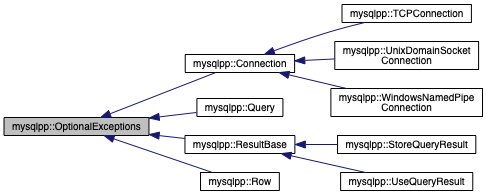Interface allowing a class to have optional exceptions. More...
#include <noexceptions.h>

Public Member Functions | |
| OptionalExceptions (bool e=true) | |
| Default constructor. More... | |
| virtual | ~OptionalExceptions () |
| Destroy object. | |
| void | enable_exceptions () const |
| Enable exceptions from the object. | |
| void | disable_exceptions () const |
| Disable exceptions from the object. | |
| bool | throw_exceptions () const |
| Returns true if exceptions are enabled. | |
Protected Member Functions | |
| void | set_exceptions (bool e) const |
| Sets the exception state to a particular value. More... | |
Friends | |
| class | NoExceptions |
| Declare NoExceptions to be our friend so it can access our protected functions. | |
Detailed Description
Interface allowing a class to have optional exceptions.
A class derives from this one to acquire a standard interface for disabling exceptions, possibly only temporarily. By default, exceptions are enabled.
Note that all methods are const even though some of them change our internal flag indicating whether exceptions should be thrown. This is justifiable because this is just an interface class, and it changes the behavior of our subclass literally only in exceptional conditions. This Jesuitical interpretation of "const" is required because you may want to disable exceptions on const subclass instances.
If it makes you feel better about this, consider that the real change isn't within the const OptionalExceptions subclass instance. What changes is the code wrapping the method call on that instance that can optionally throw an exception. This outside code is in a better position to say what "const" means than the subclass instance.
Constructor & Destructor Documentation
◆ OptionalExceptions()
|
inline |
Default constructor.
- Parameters
-
e if true, exceptions are enabled (this is the default)
Member Function Documentation
◆ set_exceptions()
|
inlineprotected |
Sets the exception state to a particular value.
This method is protected because it is only intended for use by subclasses' copy constructors and the like.
Referenced by mysqlpp::Connection::copy(), mysqlpp::ResultBase::copy(), and mysqlpp::Query::operator=().
The documentation for this class was generated from the following file: